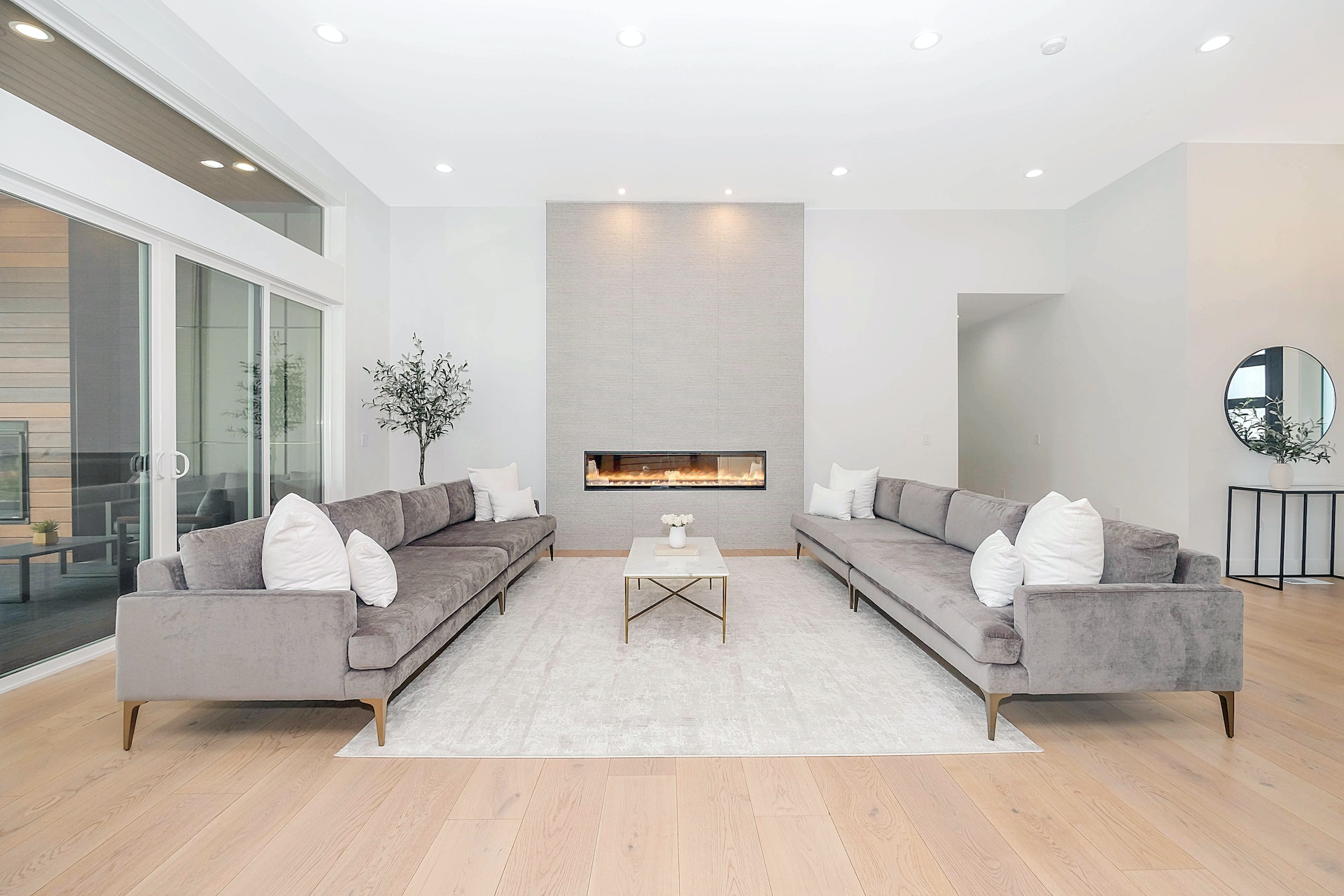If you plan on selling your home, some improvements can help attract potential buyers and increase the value of your property. Investing in the right upgrades can make a significant difference in achieving a successful sale.
When aiming for a successful sale of apartments, you can focus on curb appeal, decluttering and depersonalizing the space to allow potential buyers to envision their own life within the walls. Highlight the unique features of the apartment, whether it’s a beautiful view, ample natural light, or smart storage solutions. Communicate clearly about the property’s strengths and any potential considerations to build trust with prospective buyers.
Table of Contents
- Preparing the exterior
- Maximizing the interior
- Strategic budgeting for improvements
- Hiring professionals vs. DIY
- Give extra value
Preparing the exterior
The first impression potential buyers will have of your property will be the exterior of your home. The exterior is the initial point of contact, setting the tone for what awaits inside.
Enhance curb appeal
Plant flowers and greenery, trim the lawn, and fix any visible damage to your home’s exterior. Ensure all the outdoor lighting works and the driveway and pathway are clutter-free. Investing in curb appeal can significantly improve the value of your property.
Landscaping and greenery
A well-designed landscape ensures the outdoors looks beautiful, and it increases your home’s market value. Make sure to maintain a healthy lawn, which includes regular mowing, watering, and fertilizing. Incorporate a mix of colorful perennials and evergreens to provide year-round interest and curb appeal. Adding fresh mulch to garden beds can give your yard a polished look and help retain soil moisture. If you’re looking for greenery that requires little maintenance, choose native species, which are adapted to your local climate. Place trees and shrubs in a way that can frame your home, highlight architectural features, and even provide energy-saving shade.
Porch and entryway
Your home’s entryway sets the tone for what buyers can expect inside, so make sure the front door is clean and appealing. To complement your home’s exterior, you can get creative with doorknobs and house numbers. Add potted plants or seasonal decorations to create an inviting atmosphere. Since the porch is the first thing potential buyers see, making a lasting first impression is important.
Repairs and fresh coats of paint for exterior surfaces
Inspect the exterior for any damages, including cracks, chipped paint, or rotting wood. Give the siding and the door a fresh coat of paint if necessary. Addressing these issues and applying a fresh coat of paint can revitalize your home’s appearance, making it more attractive to buyers.
Upgrading or repairing the roof and gutters
A well-maintained roof and gutters add to the visual appeal and assure buyers of the property’s structural integrity. Consider repairs or replacements if needed, as this can significantly impact a buyer’s confidence in the home’s condition.

Maximizing the interior
The interior of your home influences a buyer’s perception and emotional connection to the property.
Decluttering and depersonalize
Clear out personal items and declutter spaces to allow potential buyers to see themselves living in the home. Remove photos, unique artwork, personalized decor, excess furniture, and clutter to create a spacious and inviting atmosphere. Neutral decor and color schemes can also make your property more appealing to a broader range of buyers.
Minor repairs and fixing issues
Attend to minor repairs like leaky faucets, squeaky doors, or cracked tiles. These seemingly insignificant issues can create doubts about the property’s overall maintenance in a buyer’s mind.
Updating fixtures
Consider inexpensive upgrades like updating light fixtures, doorknobs, or cabinet handles for a more contemporary look. If buying new is outside your budget, clean them to give them a fresher look. Smart home systems can add allure but ensure they align with a budget-friendly approach.
Enhancing lighting
Good lighting can make a significant difference in the appearance and ambiance of your home. Maximize natural light and strategically place lighting fixtures to accentuate the space and create a warm mood. Consider replacing outdated fixtures with modern, energy-efficient lighting to enhance the overall atmosphere of your property. A well-lit and welcoming home attracts buyers; these lighting enhancements can create a positive and inviting impression.
Strategic budgeting for improvements
Budgeting plays a big role in ensuring you get the most value when you sell your home. It’s like giving your investment the best chance to shine and return the rewards you deserve.
Assessing which improvements give the highest returns
Prioritize improvements that offer the most significant return on investment (ROI) when selling your home. Certain areas tend to influence a buyer’s decision-making process. Kitchens, bathrooms, and curb appeal enhancements are known to sway potential buyers. Renovations or updates in these areas can substantially elevate your home’s appeal and value in the eyes of future buyers.
Cost-effective upgrades that add value
Upgrades such as minor kitchen remodels, adding energy-efficient appliances, or landscaping improvements can significantly increase a property’s value without breaking the bank.
Creating a budget and timeline for improvements
An organized plan and schedule are crucial to avoiding overspending and guaranteeing a successful home improvement.
- Realistic budget: Evaluate your finances and set a real amount for improvements. Consider getting quotes from contractors or researching the cost of materials to estimate expenses accurately
- Structured timeline: Create a timeline outlining when each improvement will take place. This helps organize tasks and ensures that improvements are completed efficiently, allowing you to showcase your home at its best within a reasonable timeframe

Hiring professionals vs. DIY
Hiring professionals to sell your home brings expertise, experience, and specialized skills, ensuring top-notch quality and safety standards. DIY projects can be cost-effective but may need more professional knowledge and assurance. Understanding the pros and cons of each is essential to make informed choices for your home.
Pros and cons of hiring professionals
- Pros: Professionals bring expertise, experience, and specialized skills to the table, particularly in tasks like electrical work, plumbing, structural modifications, or major renovations. Their knowledge ensures quality workmanship and adherence to safety codes and standards. Professionals can efficiently navigate complex projects, saving time and minimizing the risk of costly mistakes
- Cons: While hiring professionals might involve higher upfront costs, the investment can pay off by ensuring the job is done correctly and potentially preventing future issues that could appear from amateur work
Pros and cons of DIY projects
- Pros: DIY projects can be cost-effective as they eliminate labor costs associated with hiring professionals. You have control over the expenses, buying materials, and managing the project according to your budget
- Cons: DIY projects may need more expertise and quality than professional work. Assess your skills honestly and consider the complexity of the task. Complicated or specialized work might lead to errors or safety hazards if attempted without proper knowledge and experience
Knowing when professional assistance is necessary
Certain tasks demand professional expertise due to safety concerns, legal regulations, or technical complexities. Electrical work, major plumbing alterations, structural modifications, or intricate installations often need professional assistance. Recognize your limitations and understand when to seek professional help so critical aspects of home improvement are handled safely and effectively.
Give extra value
There are other things that some people need to consider when thinking about adding value to their properties, and are as important as maintenance and upgrades. Home staging, an open house, and a home warranty will give your property extra value and increase the chances of a faster sale.
The art of home staging
Home staging is more than just arranging furniture; it creates an emotional connection between potential buyers and the property. A well-staged home sets the scene, allowing buyers to see themselves living in the space. It enhances the home’s visual appeal, functionality, and overall ambiance.
- Optimizing space and functionality: The strategic arrangement of furniture plays a big role in showcasing the full potential of each room. Maximizing space by decluttering and organizing allows buyers to perceive the functionality and versatility of the area. Look for a balanced layout that emphasizes the flow of the space, making it inviting and appealing
- Incorporating tasteful decor: Thoughtfully chosen decor elements can transform a space, adding warmth, character, and style. Neutral colors, subtle patterns, and tasteful accessories create an inviting atmosphere, allowing buyers to focus on the home’s architectural details and unique features
- Highlighting the home’s best features: Effective staging accentuates the property’s standout features. Whether it’s a picturesque view, a cozy fireplace, or high ceilings, strategically draw attention to these elements. Proper lighting and focal points can guide the buyer’s eyes toward the most appealing aspects of the home
- Utilize technology: Another valuable tool for sellers is a 3D house planner. These virtual planners allow you to map out renovations or reimagine spaces, making it easier to see how different improvements will impact your home’s appeal.
The role of home warranty
A home warranty provides repair or replacement coverage for your home’s major systems and appliances.
When selling a house, a home warranty can add value to your property, making it more attractive. When buyers know their investment is protected, they are more likely to feel confident in their purchase. They are also more likely to choose a home with a warranty over one without, even if the price is slightly higher. This can make a significant difference in a competitive market.
- Benefits for sellers and buyers: A home warranty is a safety net. For sellers, offering a home warranty with the property can boost confidence among potential buyers, demonstrating a commitment to the home’s condition post-sale. Buyers appreciate the added security that a warranty provides, especially for unforeseen repairs or replacements of major systems or appliances
- Coverage details and limitations: While it typically covers certain appliances and systems, there may be limitations, exclusions, and deductibles. Communicating these details transparently ensures that both parties understand what is and needs to be covered, avoiding misunderstandings later in the transaction
Showcasing your property
- Effective property presentations: Invest in high-quality photography and immersive virtual tours. Professional photographs highlighting your home’s best features and virtual tours offering a comprehensive view of each room will enhance your online listing. These visual representations captivate potential buyers, convincing them to schedule in-person viewings
- Hosting successful open houses: Open houses provide an excellent opportunity for potential buyers to explore the property firsthand. Create a welcoming atmosphere during these events. Consider fresh flowers soft music, and have a clean and organized space
- Engaging with potential buyers and agents: Establish good communication with potential buyers and their agents. Engaging with visitors, answering questions, and highlighting key selling points can leave a lasting positive impression. Promptly responding to inquiries, providing detailed information about the property, and accommodating viewing requests quickly can impact the level of interest and engagement from potential buyers
Preparing a home for sale involves a series of strategic steps to maximize its appeal to potential buyers. By focusing on exterior and interior enhancements, budgeting wisely, considering professional assistance when necessary, staging effectively, and showcasing your property with care, you can significantly increase your home’s chances of a successful and profitable sale.




